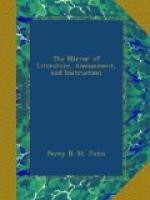It appears that the science of Cookery was in a very inferior state under the first and second race of the French kings. Gregory of Tours has preserved the account of a repast of French warriors, at which, in this refined age, we should be absolutely astounded. According to Eginhard, Charlemagne lived poorly, and ate but little—however, this trait of resemblance in Charlemagne and Napoleon, the modern Eginhards have forgotten in their comparison of these two great men. Philippe le Bel was hardly half an hour at table, and Francis I. thought more of women than of eating and drinking; nevertheless, it was under this gallant monarch that the science of gastronomy took rise in France.
Few have heard the name of Gonthier d’Andernach. What Bacon was to philosophy, Dante and Petrarch to poetry, Michael Angelo and Raphael to painting, Columbus and Gama to geography, Copernicus and Galileo to astronomy, Gonthier was in France to the art of cookery. Before him, their code of eating was formed only of loose scraps picked up here and there; the names of dishes were strange and barbarous, like the dishes themselves.
Gonthier is the father of cookery, as Descartes, of French philosophy. It is said that Gonthier, in less than ten years, invented seven cullises, nine ragouts, thirty-one sauces, and twenty-one soups.
A woman opened the gates of an enlightened age; it was Catherine, the daughter of the celebrated Lorenzo de Medici, niece of Leo the Tenth, then in all the bloom of beauty. Accompanied by a troop of perfumers, painters, astrologers, poets, and cooks, she crossed the Alps, and whilst Bullan planned the Tuileries, Berini recovered from oblivion those sauces which, for many ages, had been lost. Endowed with all the gifts of fortune, the mother and the wife of kings, nature had also gifted her with a palate, whose intuitive sensibility seldom falls to the lot of sovereigns. In consequence of which, after having driven before her this troop of male and female soothsayers, who pretended to foretel the future, she consulted her maitre d’hotel, about some roast meat brought from luxurious Florence; and dipped in a rich sauce the same hand that held the reins of the empire, and which Roussard compared to the rosy fingers of Aurora! Let the foolish vulgar laugh at the importance which the queen-mother seems to place in the art of cooking; but they have not considered that it is at table, in the midst of the fumes of Burgundy, and the savoury odour of rich dishes, that she meditated the means of quelling a dangerous faction, or the destruction of a man, who disturbed her repose. It was during dinner she had an interview with the Duke of Alba, with whom she resolved on the massacre of St. Bartholomew.




